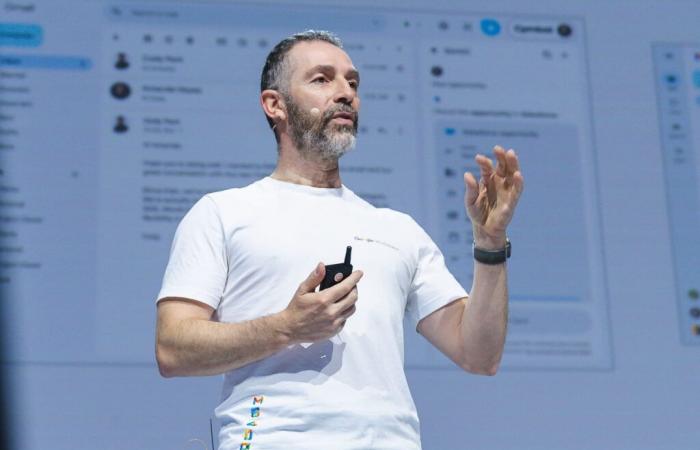Google’s AI is available in French from this Thursday, November 21 in Gmail, Docs, Sheets and Drive. Frédéric Arnoux, chief technical officer Europe Middle East & Africa at Google Workspace, presents the new features.
JDN. The Gemini deployment for Google Workspace arrives in France today after a phased launch period. What concrete changes can users expect from this integration in their Google work environment?
Frédéric Arnoux. The integration of Gemini into Google Workspace is done in two stages. First of all, for several weeks, users have had access to the Gemini application available in 45 languages, including French. This application is offered as an additional functionality (20 euros per month per user, editor’s note) to Google Workspace customers with Business, Enterprise, and Frontline Worker versions.
Today’s big news concerns the addition of French to the Gemini side panel for Workspace, along with six other languages. This is a development particularly awaited by our customers. Indeed, while English remains essential in an international context, many companies collaborate with teams based in France, Italy, Spain, Portugal and other European countries. This announcement therefore marks the first phase of the multilingual deployment of the side panel.
How can we explain that French was only integrated late into Gemini for Google Workspace?
Our priority is to offer functionalities that are perfectly optimized for each target population. For the integration of languages other than English, two approaches were possible. The first, commonly used on the market, consists of using translation tools: the French prompt is translated into English, processed, then the result is translated back into French. We have opted for a different approach, which we consider more effective: direct optimization of our models. Although the base model is in English, we fine-tune it specifically for each language. This method guarantees greater relevance of the results.
This approach not only improves the quality of responses, but also takes cultural aspects into account. For example, the wording of a response can vary significantly between French French and Canadian French. The management of these cultural and linguistic nuances by the model itself is essential, which explains a longer development time for each new language.
In which Gemini for Google Workspace usage scenarios do your customers see the best ROI?
Our 18-month customer studies show consistent results: users save an average of 105 minutes per week using Gemini in Workspace. Furthermore, 75% of them believe that the tool improves their professional efficiency.
In the marketing industry, we are seeing a noticeable acceleration in the content production cycle and campaigns through the reuse and optimization of existing assets. Gemini also enables the rapid creation of visuals for presentations, reducing reliance on external agencies. The tool also facilitates the analysis of customer data (data crunching) to extract relevant insights, without requiring advanced technical expertise.
“Users save an average of 105 minutes per week using Gemini in Workspace”
For sales teams, the tool particularly optimizes the processing of calls for tenders (RFP). It allows for rapid analysis, relevance assessment and comparison with past successes, while facilitating response generation. Salespeople also use it to efficiently prepare their customer meetings thanks to an automated analysis of available information, whether it comes from the web, internal documents or customer history.
In the area of customer relations, we are observing a significant improvement in productivity in processing support requests. The tool notably allows rapid access to relevant technical information. It also facilitates the automated creation of FAQs by leveraging a variety of sources, from technical documentation to support forums.
An unexpected but revealing use case concerns written communication. In France, in mass distribution, managers from the field use Gemini to improve the quality of their emails, thus optimizing their professional communication. Specific needs initially not anticipated.
Given the strong presence of Microsoft Copilot on the market, what are the distinctive strengths of Gemini in Google Workspace?
Our differentiation from Copilot revolves around two major axes: data governance and the relevance of results.
Regarding data governance, the press is currently reporting difficulties at Copilot related to access to documents. The problem is twofold. On the one hand, the exposure of documents normally inaccessible to users, and on the other hand, the impossibility of accessing certain relevant documents. This situation is explained in particular by the dispersion of data in the Microsoft environment between workstations, shared drives and the cloud, combined with sometimes insufficient implementation of access restrictions.
“Our differentiation from Copilot revolves around two major axes: data governance and the relevance of results”
In the Google Workspace environment, this problem is naturally resolved. All data is centralized in Drive or Gmail, which guarantees consistent access. Additionally, when migrating to Workspace, our customers necessarily have robust security and data governance models in place. These controls include fine-grained access management, DLP processes and label classification, ensuring strict compliance with appropriate restriction levels. To date, we have not received any feedback regarding issues with inappropriate data access via Gemini.
As for the relevance of the results, our advantage lies in the use of proprietary algorithms and models, developed since 2018. This complete control allows us to finely optimize our models for the Workspace environment. This is a different approach from that of Microsoft which relies on OpenAI solutions, even if these are hosted in their infrastructure and adapted to their needs.
How do you assess the pace of adoption of generative AI by French companies compared to other markets?
A recent BCG study reveals an interesting paradox. Emerging countries, particularly in Asia-Pacific, are showing faster adoption of generative AI than traditional Western countries. France is among these markets that are more conservative in their approach. Nevertheless, generative AI has become a strategic subject at the highest level of French companies. It regularly appears on the agenda of management committees and CEOs, who question the modalities and pace of adoption as well as the relevant use cases.
What new features should Gemini for Workspace users expect in the coming months?
Without revealing our precise roadmap, two major developments are emerging for Gemini in Workspace. The first concerns the development of gems, these expert agents integrated into the Gemini application. If today Gemini functions primarily as a reactive assistant that helps you accomplish your tasks more efficiently, we are moving toward a more proactive model. The assistant could, for example, take the initiative to suggest relevant actions to you. This orientation towards more proactivity is also part of a general trend in the industry. The second major development concerns multimodal, which has a double importance. On the one hand, it enriches content production, and on the other hand, it improves the quality of interactions.






